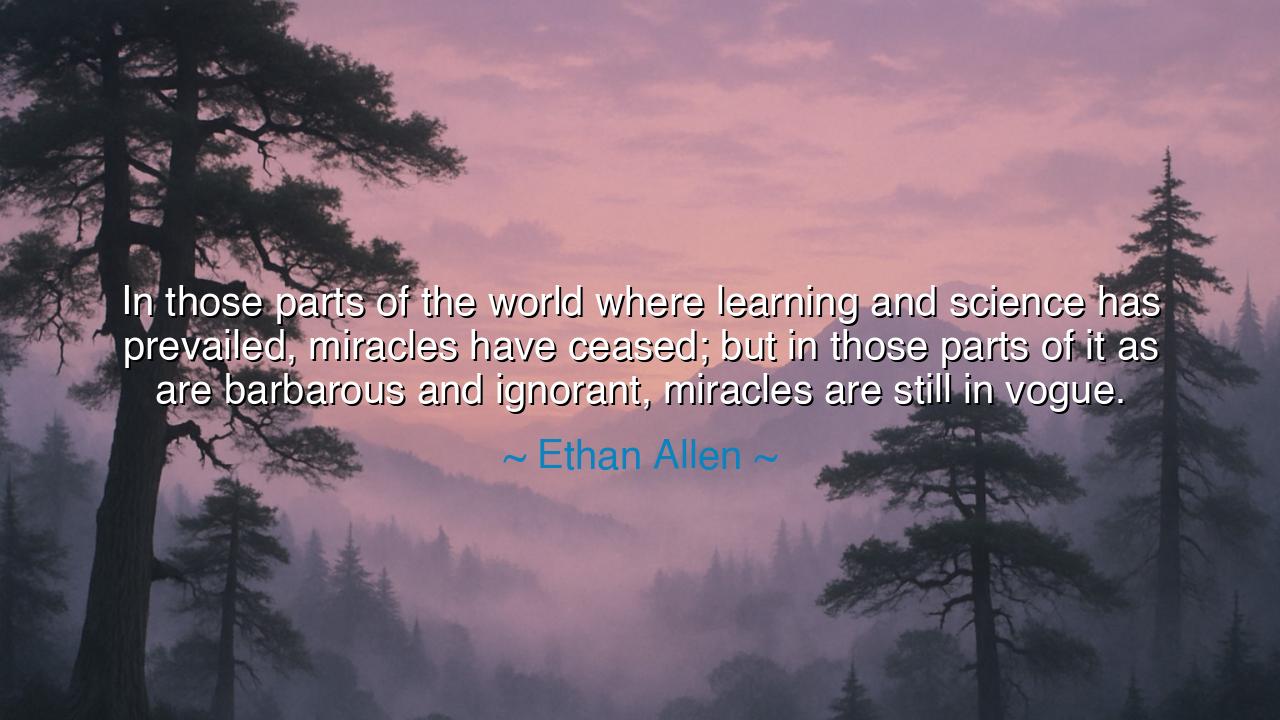
In those parts of the world where learning and science has
In those parts of the world where learning and science has prevailed, miracles have ceased; but in those parts of it as are barbarous and ignorant, miracles are still in vogue.






There are moments when truth arrives like lightning — sudden, shocking, and impossible to ignore. Such was the nature of Ethan Allen, a man of fierce independence and unflinching reason, who once declared: “In those parts of the world where learning and science has prevailed, miracles have ceased; but in those parts of it as are barbarous and ignorant, miracles are still in vogue.” Beneath this declaration lies a profound reflection on the relationship between knowledge and belief, between the light of understanding and the shadows of superstition. It is a statement not of mockery toward faith, but of reverence toward truth — a reminder that as wisdom grows, the mysterious gives way to the comprehensible, and what once seemed divine intervention is revealed as the patient work of nature and mind.
The meaning of Allen’s words rests upon the transformation of the human spirit through learning. In ages past, when storms raged or disease struck, people called them miracles or curses, the hand of gods or spirits unseen. Yet, as knowledge advanced — as science taught us to read the laws of the universe — humanity discovered that the miraculous often dwelt not in the supernatural, but in the natural order itself. The thunder was no longer the voice of angry deities, but the electric pulse of heaven; illness no longer the punishment of gods, but the imbalance of matter within the body. Thus, miracles ceased not because wonder disappeared, but because understanding deepened.
The origin of this thought lies in the Enlightenment — that great age of awakening when thinkers across the world began to cast aside fear and seek the truth through reason. Ethan Allen, though remembered as a revolutionary soldier and founder of Vermont, was also a philosopher who challenged the authority of blind faith. He lived in a time when the fires of superstition still burned alongside the dawn of rational inquiry. His words reflect both the triumph and the tension of that era: that humanity, while forever longing for mystery, must also learn to embrace the discipline of evidence and reason. For he believed that truth was itself the highest form of the miraculous — the miracle that endures when all illusions fade.
History is filled with examples that illuminate his meaning. Consider the story of the plague in medieval Europe. In those dark days, men and women prayed, whipped themselves, and burned supposed witches in hopes of divine mercy. Yet centuries later, when science prevailed, the source of plague was discovered — a bacterium carried by rats and fleas. What was once called the wrath of God was revealed as a matter of biology. Did this make life less sacred? No. It made it more sacred, for it taught humanity that even the smallest creatures — unseen and humble — could shape the fate of nations. Thus, knowledge did not destroy wonder; it redeemed it, by grounding it in the order of creation itself.
But Allen’s words also contain a warning. When he speaks of “barbarous and ignorant” lands, he does not mean to insult nations, but to condemn the condition of mind that clings to ignorance and fear. For superstition thrives wherever men abandon inquiry, wherever authority replaces curiosity, wherever people choose comfort over truth. Even in enlightened times, if the love of learning fades, the world will return to its shadows, and “miracles” — born of rumor, panic, and falsehood — will again hold sway. The barbarism he speaks of is not a state of civilization, but of the spirit — for even a learned man can live in darkness if he refuses to think.
Yet there is beauty, too, in his message — for he does not call for the death of wonder, but for its purification. True science does not destroy mystery; it transforms it. The more we learn of the stars, the deeper our awe becomes; the more we understand the workings of life, the greater our reverence for its design. To replace false miracles with real knowledge is not to diminish creation, but to honor it. The heavens are no less magnificent for knowing the laws that govern them — they are more so, because through knowledge, we glimpse the divine order written in every atom, every galaxy, every breath.
Let this be the teaching for all generations: learning is the light that frees us from fear. Seek knowledge not to destroy belief, but to refine it. Honor faith, but temper it with understanding. Do not mistake ignorance for innocence, nor superstition for sanctity. For as Ethan Allen reminds us, the true miracle is not that the unknown vanishes when we learn — it is that the world grows even more wondrous when we finally begin to see it clearly. In every discovery, in every law uncovered, in every truth made plain, the voice of creation still whispers: “Behold, I am still here — not in mystery’s absence, but in wisdom’s light.”






AAdministratorAdministrator
Welcome, honored guests. Please leave a comment, we will respond soon